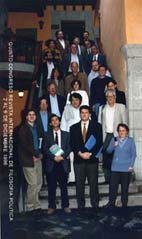Brief history
 The background of the group dates back to the research project Rational approaches to the theory of justice in today's world, coordinated since 1993 by Albert Saoner, and to the following research and projects developed in continuity with that, directed by Bernat Riutort, since 1999, around Justice and social transformations in the crisis of the Welfare State; and Globalization, democratic legitimacy and sustainability.
The background of the group dates back to the research project Rational approaches to the theory of justice in today's world, coordinated since 1993 by Albert Saoner, and to the following research and projects developed in continuity with that, directed by Bernat Riutort, since 1999, around Justice and social transformations in the crisis of the Welfare State; and Globalization, democratic legitimacy and sustainability.
 In line with that pivotal moment in the development of practical philosophy -moral, political and social-, the group regularly participated in the activities of the group of researchers around the Ibero-American Association of Political Philosophy and the International Journal of Political Philosophy. (in the photo on the left, the RIFP group in 1996 meeting in Segovia). One of the outcomes of this work was the creation of the Permanent Seminar in Policial and Social Analysis of the UIB, where prominent intellectuals from the Latin American world have accompanied us, such as Sergio Pérez, Hugo Quiroga, Silvia Levín, Ofelia Pérez, Susana Villavicencio, Luzia Helena Herrmann de Oliveira, María Teresa La Valle, Edgardo Mocca, Julio de Zan, Marcelo Bechara, and Mirta Giacaglia.
In line with that pivotal moment in the development of practical philosophy -moral, political and social-, the group regularly participated in the activities of the group of researchers around the Ibero-American Association of Political Philosophy and the International Journal of Political Philosophy. (in the photo on the left, the RIFP group in 1996 meeting in Segovia). One of the outcomes of this work was the creation of the Permanent Seminar in Policial and Social Analysis of the UIB, where prominent intellectuals from the Latin American world have accompanied us, such as Sergio Pérez, Hugo Quiroga, Silvia Levín, Ofelia Pérez, Susana Villavicencio, Luzia Helena Herrmann de Oliveira, María Teresa La Valle, Edgardo Mocca, Julio de Zan, Marcelo Bechara, and Mirta Giacaglia.
 More recently, our research has reinforced, on the one hand, the axis of gender and feminist studies, especially as a result of participation in the research project The Europe of Women. Political Construction and New Forms of Citizenship, coordinated by Maria Xosé Agra between 2013 and 2016 (team photo, on the right). Broadly, we have focused on the emergence of new forms of democratic political articulation, addressed in the Public Sphere and Emerging Subjects- PUBLIC project, coordinated by Joaquín Valdivielso and Bernat Riutort, between 2016 and 2020.
More recently, our research has reinforced, on the one hand, the axis of gender and feminist studies, especially as a result of participation in the research project The Europe of Women. Political Construction and New Forms of Citizenship, coordinated by Maria Xosé Agra between 2013 and 2016 (team photo, on the right). Broadly, we have focused on the emergence of new forms of democratic political articulation, addressed in the Public Sphere and Emerging Subjects- PUBLIC project, coordinated by Joaquín Valdivielso and Bernat Riutort, between 2016 and 2020.

Subsequently, we have continued these lines of work in the project Biological reproduction, social reproduction and public sphere - REPRODUCE (team photo on the left), since 2021, coordinated by Lucrecia Burges and Joaquín Valdivielso. The Seminar on Practical Philosophy, in the wake of the Permanent Seminar on Political and Social Analysis, of which it continues, is our main space for dissemination, debate and training for researchers, students and the general public.